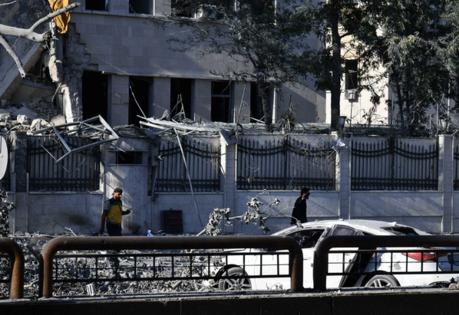Syrian clashes ease after Israeli airstrikes in Damascus
Published in News & Features
Deadly sectarian clashes in Syria seemingly eased on Thursday, after a ceasefire was announced between groups fighting in Suwayda and government forces started to withdraw from the Druze-majority southern province.
Syria’s interim President Ahmed al-Sharaa, in his first public comments since violence broke out over the weekend, said he had reached an agreement with Druze factions to withdraw from Suwayda and hand over security responsibilities to the local group. Israel hasn’t commented on the ceasefire but said Wednesday it would continue to strike Syria until the government pulled out of Suwayda.
The fighting is some of the worst since Islamist groups led by Sharaa overthrew Bashar Assad’s regime late last year and threatens to unravel efforts to stabilize Syria in the post-civil war era. Since assuming the interim leadership of the country, Sharaa has sought to assert control over the territory and its institutions, including the military.
“We were facing two options: an open war with the Israeli entity at the expense of the Druze and destabilizing Syria and the entire region or make room for Druze locals to return to wisdom and prioritize national interest,” Sharaa said.
Handing over security over Suwayda to the local Druze authorities highlights the challenges for political transition in Syria.
In his speech, Sharaa accused Israel of trying to drag the country into chaos after it launched airstrikes in Syria, which officials said are meant to defend the Druze minority group. In turn, Israel accused the government of directing fighting against the Druze, a community the Jewish state has pledged to protect.
On Wednesday, Israel struck Syria’s military headquarters in Damascus, near the presidential palace, and moved more troops near the border. It said a buildup of Syrian military near Israel’s north-eastern border raises a security threat.
Israel Defense Forces Chief of Staff Eyal Zamir said the army won’t allow “southern Syria to become a terror stronghold.”
The Syrian Observatory for Human Rights said at least 360 people have been killed in Suwayda since clashes started, with 27 being executed. The deaths include 207 members of the Syrian security forces, the SOHR said.
Violent fighting erupted between Sunni Muslim Bedouin groups and Druze residents in the southern area of Suwayda over the weekend. Sharaa said the fighting, which he said is the product of long-standing sectarian disputes, prompted government forces to intervene.
On Wednesday, Israel vowed to continue its attacks until government forces withdrew from Suwayda, which the Syrian observatory said is in progress.
The Druze are Arabs whose faith is an offshoot of Islam. There are 1 million of them, living mostly in Syria, Lebanon and Israel. Israeli Druze men do military service and, with their Arabic and loyalty to the Israeli state, often rise high in the ranks.
There are around 20,000 Druze in the Golan Heights, which Israel conquered from Syria in 1967 and annexed in 1981. Most of those Druze identify more with Syria than Israel, although there have been signs of that changing among the younger generations.
In his speech, Sharaa praised mediation efforts by the U.S., Turkey and Arab countries that he said spared the region from “an uncertain fate” after Israel’s strikes on civilian and government facilities.
While Israel’s strikes and the clashes have been confined to Syria, they are raising regional tensions. The Gulf Cooperation Council, which includes Saudi Arabia, described Israel’s airstrikes as an irresponsible escalation likely to further destabilize Syria.
U.S. Secretary of State Marco Rubio said in a post on X that he engaged all the parties involved and “agreed on specific steps that will bring this troubling and horrifying situation to an end tonight.
©2025 Bloomberg L.P. Visit bloomberg.com. Distributed by Tribune Content Agency, LLC.







Comments